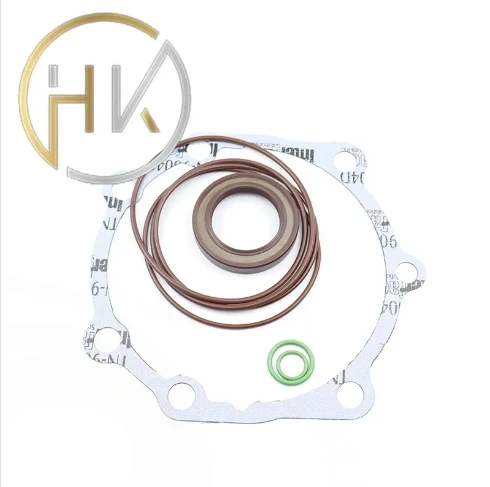Samh . 07, 2024 17:37 Back to list
Understanding Motor Seal Functions and Importance in Machinery Performance
Understanding Motor Seals Essential Components for Efficiency and Reliability
Motor seals play a critical role in the functionality and longevity of various machinery, particularly in engines and electric motors. These seals are designed to prevent the leakage of fluids and gases from the motor components, ensuring optimal performance and efficiency. In this article, we will delve into the importance of motor seals, their types, applications, and maintenance practices.
The Importance of Motor Seals
Motor seals serve several vital purposes
1. Leak Prevention One of the primary functions of motor seals is to prevent the escape of lubricants and coolant fluids. Any leakage can lead to reduced efficiency, overheating, and could potentially cause catastrophic failures.
2. Contamination Protection Seals also act as barriers to prevent contaminants such as dirt, dust, and moisture from entering the motor. These foreign particles can cause significant wear and tear on internal components, ultimately decreasing the motor's performance and lifespan.
3. Pressure Control Many motors operate under high pressure. Seals help maintain the necessary pressure within the motor, ensuring that performance levels are met. This is crucial in various applications where precision and reliability are paramount.
4. Energy Efficiency Properly functioning seals contribute to the energy efficiency of the motor. By preventing leaks and maintaining optimal pressure, seals reduce the energy required to operate the motor, leading to lower operational costs.
Types of Motor Seals
There are several types of motor seals, each designed for specific applications
1. Rotary Seals Commonly used in applications involving rotating shafts, rotary seals prevent the loss of lubricant and protect against external contaminants. These are often made from elastomeric materials that can withstand both dynamic and static conditions.
2. Statical Seals These seals are used in non-moving parts of the motor. They are typically utilized in flanges, joints, and housings to prevent leaks at connection points.
3. Mechanical Seals Found in applications such as pumps and compressors, mechanical seals work by using a combination of stationary and rotating components to create a tight seal. They are highly effective in preventing leaks and are essential for maintaining pressure.
motor seal

4. Lip Seals These seals feature a flexible lip that adapts to the shaft's surface. Lip seals are commonly used in automotive and industrial applications due to their ability to maintain a good seal under varying conditions.
Applications of Motor Seals
Motor seals are widely used across various industries, including
- Automotive In vehicles, motor seals are critical for keeping lubricants within engine components and preventing oil leaks, which can lead to performance issues and environmental hazards. - Industrial Machinery In manufacturing, heavy machinery relies on motor seals to function correctly. They protect against oil and coolant loss, which can disrupt operations.
- Aerospace In aviation applications, motor seals must meet stringent safety standards. They are used to ensure that engines operate efficiently under high-stress conditions.
- HVAC Systems In heating, ventilation, and air conditioning systems, seals help maintain efficiency by preventing refrigerant leaks and keeping contaminants out.
Maintenance of Motor Seals
To ensure the longevity and effectiveness of motor seals, regular maintenance is essential
1. Routine Inspections Checking seals regularly for wear, cracks, or deformation can help identify issues before they lead to leaks or failures.
2. Replacement Seals wear out over time. It's crucial to replace them according to manufacturer recommendations and when any signs of degradation are observed.
3. Proper Installation Incorrect installation can lead to premature failure. Following proper techniques and ensuring compatibility with the motor components is vital.
In conclusion, motor seals are indispensable components that safeguard the performance, efficiency, and reliability of motors across various applications. By understanding their functions, types, and maintenance needs, operators can ensure the smooth operation of their machinery, extending its lifespan and reducing the risk of costly repairs. Proper attention to these components promotes not only operational efficiency but also overall safety in industrial and automotive environments.
-
The Trans-formative Journey of Wheel Hub Oil Seals
NewsJun.06,2025
-
Graphene-Enhanced Oil Seals: Revolutionizing High-Pressure Oil Sealing
NewsJun.06,2025
-
Future of Hydraulic Sealing: Advanced Intelligent TCN Oil Seals
NewsJun.06,2025
-
Don’t Let a Broken TCV Oil Seal Ruin Your Day
NewsJun.06,2025
-
Bio-Inspired Dust Seals for Better Sealing Performance
NewsJun.06,2025
-
Biodegradable and Sustainable Hydraulic Seal Materials
NewsJun.06,2025
-
Top Oil Seal Solutions for Your Industrial Needs
NewsMay.22,2025
Products categories
















